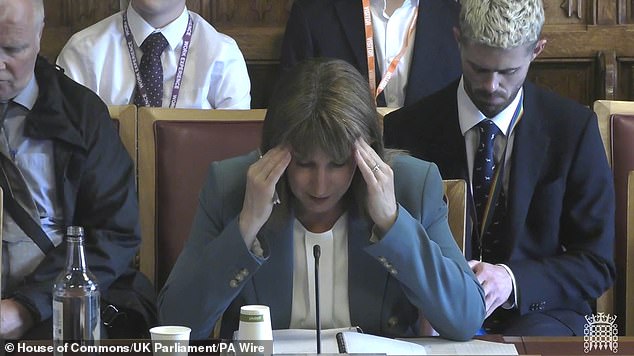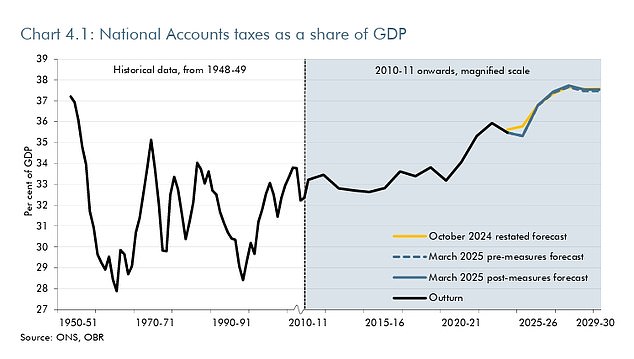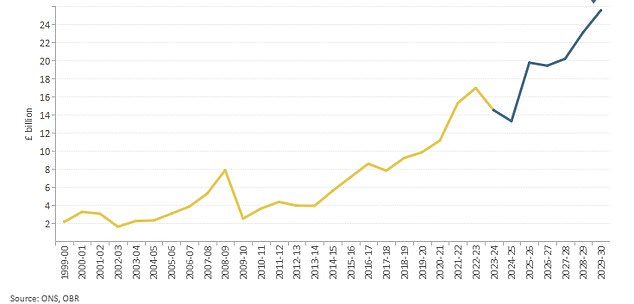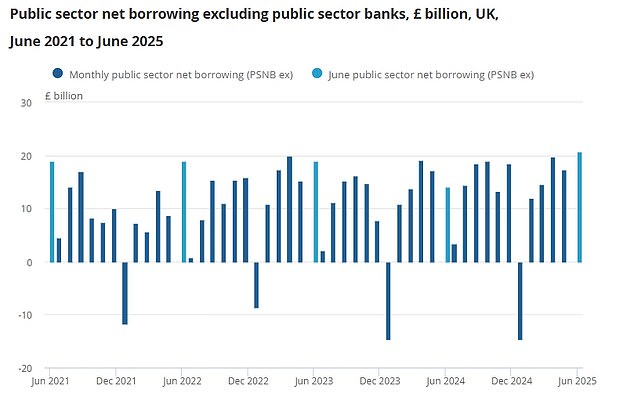Labour has been warned that tax raids on the wealthy are already ‘backfiring’ amid signs that Rachel Reeves is preparing to come back for more.
Analysts have pointed to figures showing capital gains tax receipts dipping in the first half of the year, despite the Chancellor hiking rates.
Meanwhile, the boss of Goldman Sachs has raised concerns that further efforts to bring in revenue could fuel an exodus, with London‘s status as a financial hub ‘fragile’.
Ms Reeves is desperately hunting for options to increase taxes as she faces an estimated £30billion black hole in the public finances at the Autumn Budget.
The tax burden is already set to hit a new high as a proportion of GDP after the last Budget imposed a £41billion increase – the biggest on record for a single package.
Labour has ruled out increasing income tax, employee national insurance or VAT.

Labour has been warned that tax raids on the wealthy are already ‘backfiring’ amid signs that Rachel Reeves is preparing to come back for more

Challenged on whether taxes at around 38 per cent of GDP represented a ‘ceiling’, the Chancellor stressed that her rules only covered spending and debt
The Chancellor again refused to rule out a wealth tax yesterday, with backbenchers floating a percentage charge on assets to raise billions of pounds a year.
However, Shaun Moore, tax and financial planning expert at investment firm Quilter, warned such moves could actually cause more harm to revenues after a crackdown on ‘non doms’.
At the Budget last year Ms Reeves increased the lower rate of CGT from 10 per cent to 18 per cent and the higher rate from 20 per cent to 24 per cent.
But in the first six months of this year the tax raked in £11.8 billion, compared to £13.5billion during the same period in 2024.
The receipts for 2024-25 were around £200million lower than the Treasury’s OBR watchdog had anticipated. The body has forecast that revenues will surge in 2025-26.
‘The government’s decision to slash capital gains tax allowances and hike rates has backfired,’ Mr Moore said.
‘The policy may have been designed to raise revenue, but it’s instead prompted behavioural shifts that have dented the tax take.’
He added: ‘While taxing the wealthiest may sound politically appealing, the CGT experience shows that people will change behaviour or adjust their financial plans to mitigate the tax bills.’
Goldman Sachs chairman and chief executive David Solomon told Sky News presenter Wilfred Frost’s The Master Investor Podcast that talent in the financial industry was ‘much more mobile’ than 25 years ago.
‘London continues to be an important financial centre. But because of Brexit, because of the way the world’s evolving, the talent that was more centred here is more mobile,’ Mr Solomon said.
‘We as a firm have many more people on the continent. Policy matters, incentives matter.
‘I’m encouraged by some of what the current government is talking about in terms of supporting business and trying to support a more growth oriented agenda.
‘But if you don’t set a policy that keeps talent here, that encourages capital formation here, I think over time you risk that.’
Mr Solomon cautioned that the status of the City of London was ‘fragile’ and could ‘fray’ if not treated with care.

CGT receipts for 2024-25 were around £200million lower than the Treasury’s OBR watchdog had anticipated. The body has forecast that revenues will surge in 2025-26

The public sector borrowed £20.7billion last month, far higher than the £17.6billion analysts had pencilled in
‘Incentives matter if you create tax policy or incentives that push people away, you harm your economy,’ he said.
‘If you go back, you know, ten years ago, I think we probably had 80 people in Paris.
‘You know, we have 400 people in Paris now… And so in Goldman Sachs today, if you’re in Europe, you can live in London, you can live in Paris, you can live in Germany, in Frankfurt or Munich, you can live in Italy, you can live in Switzerland.
‘And we’ve got, you know, real offices. You just have to recognise talent is more mobile.’











